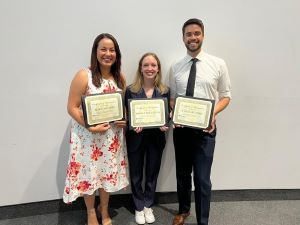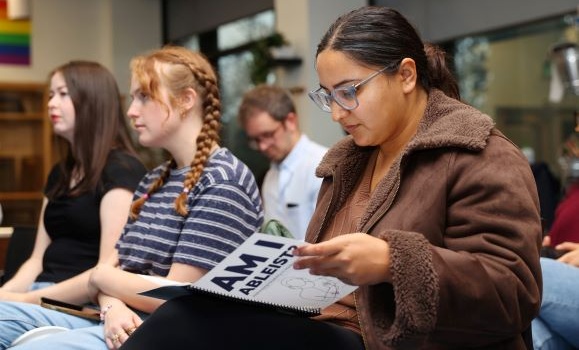Three recent Dalhousie University graduates can add award-winning work as authors and activists to their resumes.
Dr. Abbie McClellan, Dr. Malihan Farid, and Dr. Zachary Ford, who wrote, developed, and designed the book “Am I an Ableist? Disability Awareness in Health Care,” received the Curriculum Innovation Award at the American Academy of Developmental Medicine and Dentistry (AADMD) conference in Chicago, Illinois in early June.
They painstakingly created their award-winning e-book over the last three years of their medical school training, which has been viewed by more than 15,500 people and is integrated into medical and allied health education curricula across North America. The book helps students understand attitudes toward disability, explore underlying biases, and recognize how these biases impact health care delivery.
Empowering trainees
Motivated to fill gaps in disability education, the three co-authors aimed to help medical trainees practice more inclusively, respectfully, and effectively, ultimately improving the quality of care for people with disabilities.
“The idea for this book came from our experiences as medical students,” says Dr. Farid. “A defining moment came when, during our clinical placements, we witnessed a patient with a disability receiving suboptimal treatment due to misunderstandings and biases from the medical team. This incident highlighted the urgent need to incorporate comprehensive disability education into medical curricula.”
Dr. McClellan was also inspired by her sister, who has cerebral palsy and is now completing a Masters in Social Work and working for disability rights and accessibility.
“Ever since we were little, we talked a lot about ableism and disability and her advocacy work,” says Dr. McClellan. “I knew I wanted to continue this work by teaching others, especially my fellow healthcare professionals. When I started medical school, I realized there was a need for resources on these topics, and since none existed, we decided to create one ourselves.”
With the support and encouragement of disability advocates and organizations, the three authors thoroughly researched key areas of disability education gaps in medical training, worked with the Regional Resident Services Society (RRSS) through the Dalhousie Service Learning Program, and held focus groups to hear input from people with disabilities and shape the book’s content.
 After multiple drafts and feedback from disability advocacy groups across Canada, they finalized the content and worked to transform the document into an interactive e-book with exercises and case studies.
After multiple drafts and feedback from disability advocacy groups across Canada, they finalized the content and worked to transform the document into an interactive e-book with exercises and case studies.
A central theme of this book is to help individuals identify the disability model they use and understand how they apply it in their clinical interactions. The book emphasizes implicit bias and self-reflection through exercises, encouraging readers to examine their prejudices and attitudes toward people with disabilities, and fostering empathy and patient-centered care.
“The activities in this book challenge readers to think critically about their assumptions and decision-making processes,” says Dr. Farid. “By providing respectful language, easy-to-follow practices, and concrete examples of comprehensive care, it gives healthcare professionals the tools they need to create more empathetic and effective healthcare environments.”
Challenging assumptions
The integration of “Am I an Ableist? Disability Awareness in Healthcare” into the medical and allied health curriculum was driven by the goal of maximizing student engagement and was born out of a recognition of the need for proactive outreach, strategic partnerships, and improved disability education.
At Dalhousie University, Am I Disabled serves as a resource for students and instructors working on new and diverse cases and is included in first-year medical professional competency cases. It is also integrated into tutorials for medical students at the University of Saskatchewan, the Disability Support and Services program at Nova Scotia Community College, and the Certified Practical Nursing program. It is also part of the first-year nursing syllabus at the Trent/Fleming School of Nursing and the clinical skills curriculum at the University of Toronto’s Faculty of Medicine.
Dr. McClellan emphasizes that maximizing student engagement by incorporating the resource into the curriculum has always been the goal. The resource is designed to be made up of small, easy-to-follow chapters, less than 20 pages long, giving it the flexibility to be used in university programs.
“The response from educational institutions has been overwhelmingly positive,” says Farid, “and students have provided positive feedback and seem to really appreciate the opportunity to engage in real-world scenarios and self-reflection exercises that challenge their assumptions and broaden their understanding.”
Dr. Lynette Reid, who led case diversity for the Med1/2 tutorial as part of the Case Diversity Working Group, says recent research supports the claims made by disability rights groups.
“Without the skills to provide clinical care to people with disabilities and the self-reflection necessary to understand assumptions and biases, patients with disabilities will not receive the same quality of care. This is a great resource for the curriculum development work we did with the Case Diversity Project, and it has such great potential that we hope to see the program grow even further.”
Change your mindset
Drs. Farid, McClellan and Ford have been working on writing and designing “Am I Ableist” for three years while juggling their medical school studies and personal responsibilities, and they hope their efforts will fundamentally change how disability is perceived and addressed in medical education and practice.
Dr. McClellan reiterates, “What makes this resource unique is that the content is embedded with opportunities for self-reflection and application to your own clinical role and healthcare setting, making learning more active and personal.” By educating students early in their training, they hope to instill a mindset of empathy, respect and patient-centred care that will carry over into their professional careers.
The co-authors, who are currently residents in three Dalhousie programs, are eager to continue the conversation about disability awareness and plan to publish an audio version of the book to increase accessibility, as well as collaborate with groups in Canada and the U.S. to reach a wider audience and put disability education at the forefront of medical training.
But their ultimate goal is to achieve a health care system in which all individuals, regardless of ability, are treated with dignity and their unique needs are met with competence and compassion.

